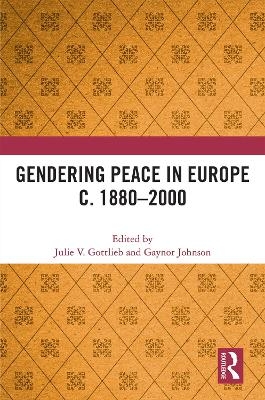
Gendering Peace in Europe c. 1880–2000
Routledge (Verlag)
978-1-032-22725-2 (ISBN)
This book examines the connection between notions of gender, diplomacy, society and peacemaking in the period c. 1880 to the mid- to late-twentieth century.
The chapters in this volume place gender history at the interface with international history and international relations. They explore a wide variety of themes and issues within the British and European context, especially notions of gender identity, the politics and culture of women’s suffrage in the early part of the twentieth century and the role gender played in the formulation and execution of British foreign policy. The book also breaks new ground by attempting to gender diplomacy. Further, it revisits the popular view that women were connected with the peace movements that grew up after the First World War because the notion of peace was associated with stereotypical female traits, such as the rejection of violence and the nurturing rather than destruction of humankind.
The chapters in this book were originally published as a special issue of the journal Diplomacy and Statecraft.
Julie V. Gottlieb is Professor of Modern History at the University of Sheffield, UK. She has written extensively on women and politics in modern Britain, including monographs Feminine Fascism: Women and Britain's Fascist Movement 1923-1945 (2000, reissued with a new preface by the author in 2021) and 'Guilty Women', Foreign Policy and Appeasement in Inter-war Britain (2015). She organised the conference 'Gendering Peace in Europe, c. 1918-1945' in January 2017, upon which this book is based. Gaynor Johnson is Professor of International History at the University of Kent, UK, and is Honorary Researcher at Lancaster University’s Centre for War and Diplomacy, UK. She is the author and editor of several books on British foreign policy in the twentieth century, including The Berlin Embassy of Lord D’Abernon, 1920-1926 (2002), The Foreign Office and British Diplomacy in the Twentieth Century (Routledge, 2004) and, most recently, Lord Robert Cecil: Politician and Internationalist (Routledge, 2013).
Introduction: Gendering Peace in Europe 1. ‘Allowed to Serve, Not to Speak’? The Role of Women in International Peace Activism, 1880-1920 2. Love as Moral Imperative and Gendered Anti-war Strategy in the International Women’s Movement 1914-1919 3. Between Pacifism and Militancy: Socialist Women in the First Austrian Republic, 1918–1934 4. Peace and Protest in Ireland: Women’s Activism in Ireland, 1918-1937 5. Women’s Organisations, Active Citizenship, and the Peace Movement: New Perspectives on Female Activism in Britain, 1918-1939 6. Yugoslav Women’s Movement and "The Happiness to the World" 7. Gender and the "Jews’ War": Women, Anti-Semitism, and Anti-War Campaigns in Britain, 1938-1940 8. Women Clerks and Typists in the British Foreign Office, 1920-1960: A Prosopographic Study 9. ‘Safety First’: Gender and the Boundaries of Diplomatic Identity in Britain, 1945-1970
| Erscheinungsdatum | 31.01.2024 |
|---|---|
| Verlagsort | London |
| Sprache | englisch |
| Maße | 174 x 246 mm |
| Gewicht | 453 g |
| Themenwelt | Geisteswissenschaften ► Geschichte |
| Sozialwissenschaften ► Politik / Verwaltung ► Europäische / Internationale Politik | |
| Sozialwissenschaften ► Soziologie ► Gender Studies | |
| ISBN-10 | 1-032-22725-7 / 1032227257 |
| ISBN-13 | 978-1-032-22725-2 / 9781032227252 |
| Zustand | Neuware |
| Haben Sie eine Frage zum Produkt? |
aus dem Bereich


